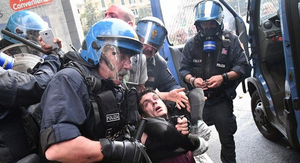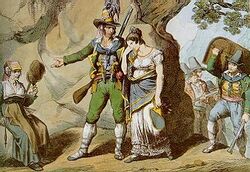Operation Gladio: Difference between revisions
| Line 58: | Line 58: | ||
=== Anti-Mafia sentiment === | === Anti-Mafia sentiment === | ||
Throughout much of the mafia's existence, public sentiment toward them ebbed and flowed. In several cases, during the Great War and the immediate aftermath of the Solarian War, many Etrurians viewed the mafia groups positively, noting their protection from petty criminals and roving groups of demobbed and unemployed soldiers. As prominent social commentator, Roberto Salvani noted in 1979, ''"the only times that any Etrurian mind sets against the mafiosi, are the times that the depths of their criminality and corruption become clear and public. When they lay low, many a Etrurian merely accept the mafiosi as a natural part of life."'' | |||
Throughout the late 20th century it became widely accepted that sentiments toward the mafia were often driven by the political climate, rather than entrenched shared social views. When a particular government or political party took a hardline position toward the mafia, public sentiments often turned against organised crime and the mafia. However, many times that sentiments were driven by politics was during election periods, where the centre-right would flesh out their anti-mafia credentials as an electoral tool rather than an established party policy. | |||
During the early 2010s however, public sentiment turned harshly against the mafia. Repeated and expansive corruption scandals at all levels of government involving the mafia proved highly damaging. The high levels of corruption and criminality was seized upon by the Etrurian populist right, especially the [[Coalition of the Right]] and subsequently the [[Tribune Movement]]. The populist right proved so successful in weaponising corruption against the mainstream parties that it permiated within general society. | |||
By 2016 and the breakin of the [[Meraviglia Scandal]], that up to 88% of Etrurians backed "all necessary means to confront organised crime", while 89% saw the mafia negatively. This increased 92% during the height of the Meraviglia Trials and stabilised at 90% upon the start of Operation Gladio in December 2018. | |||
=== Tribune Movement government === | === Tribune Movement government === | ||
=== Civil Security Act === | === Civil Security Act === | ||
Revision as of 21:38, 9 December 2019
This article is incomplete because it is pending further input from participants, or it is a work-in-progress by one author. Please comment on this article's talk page to share your input, comments and questions. Note: To contribute to this article, you may need to seek help from the author(s) of this page. |
| Operation Gladio | |||||||
|---|---|---|---|---|---|---|---|
 Police detaining Lucca "il Volpe" Abate | |||||||
| |||||||
| Belligerents | |||||||
| Organised crime syndicates and groups | |||||||
| Commanders and leaders | |||||||
|
| Numerous crime lords | ||||||
| Strength | |||||||
|
~35,000 police officers ~2,500 CSS agents 1,200 soldiers | ~10,000-15,000 | ||||||
| Casualties and losses | |||||||
|
14 killed 46 injured |
86 killed 108 injured 11,583 arrested | ||||||
|
3 civilians killed 19 injured | |||||||
Operation Gladio (Etrurian: Operazione Gladio) was a law-enforcement-military anti-Mafia operation that took place between 10-11 December 2018 in Etruria. The operation involved near simultaneous raids against over 100 criminal sydnicates and groups, the mass arrests of criminal suspects and confiscation of assets owned by targeted groups. During the operation, a total of 103 people were killed, 173 injured and 11,500 arrested.
The operation was the largest civil-military anti-Mafia action in history and is widely lauded as the most successful to date, with the total collapse of 80% of known organised crime groups in Etruria and the collapse of both the sex and arms trade. However, the operation was also widely criticised prior and after, due to concerns over civil liberties, cases of abuse and torture and the mass detention of persons without trial. In the months following the operation, further controversy arose over the Etrurian government using anti-Mafia legislation to target media outlets.
Background
Organised crime in Etruria
Organised crime in Etruria can trace its roots as far back as the 18th century, where groups of brigands coalesced into formal confederations during the immediate aftermath of the collapse of the Pereramonic Empire, and prior to the unification of Etruria. These groups were mostly prevelant in the Vespasian-Novalian border regions, and northern Vespasia before evolving overtime to consolidate positions within many of Etruria's cities.
Between thw 18th century and early 20th century, these groups rarely evolved beyond lower-level activities as extortion, cattle theft and, upon Etruria becoming a democratic republic, election slugging in addition to other kinds of relatively low-level theft and fraud. Their power and influence over communities and society ebbed and flowed, dependent upon the responses of both state-level and central government. During the 1880s, the Etrurian government launched a major effort to combat the influence of these criminal groups, almost destroying their overseas smuggling activities.
During the early 20th century and during the Great War, the numerous groups moved into the sex trade and gambling, establishing a network of brothels and casinos across northern Etruria, to serve the large numbers of mobilised soldiers. The Great War proved a profitble period for many groups, who soon used their considerable wealth to infiltrate political circles. The political chaos of the post-Great War period saw the rise of the far-right Etrurian Revolutionary Republic regime, which immediately launched anti-mafia operations, nearly destroying numerous groups between 1938 and 1939, before halting in all operations unexpectedly.
Despite going into hiding during the Solarian War, the mafia emerged in the 1950s, to seize upon the mass construction boom taking place due to war-time reconstruction. Taking advantage of the opportunity, the mafia groups gained control of the building contracts and made millions of florin. It participated in the growing business of large-scale heroin trafficking, both in Etruria and Euclea. Many of these groups relied on historic smuggling routes from Etrurian colonies in Coius to funnel large quantities of opium and heroin into Euclea.
The Mafia had influence in 'legitimate' power, particularly under the corrupt liberal governments from the 1950s to the 1960s and during the military dictatorship from the 1960s until the 1980s. It has had influence with lawyers, financiers, and professionals; also it has had power and resources by bribing or pressuring politicians, judges and administrators. This influence waned following the return of democracy in 1983, as a renewed culture of civic duty emerged within the political class. However, much of the mafia's commericial activities expanded dramatically during the 1990s and 2000s economic boom.
In the 2010s, the influence of the mafia became more public, with overt and violent incidents against rival groups and innocents alike. Numerous corruption scandals involving government officials and the mafia erupted in the early 2000s, ultimately eroding public trust in the two major political parties. The exposure of mafia connections to politics and their immense network within the business world played a key political role in the 2016 EC referendum and rise of the Tribune Movement.
Anti-Mafia sentiment
Throughout much of the mafia's existence, public sentiment toward them ebbed and flowed. In several cases, during the Great War and the immediate aftermath of the Solarian War, many Etrurians viewed the mafia groups positively, noting their protection from petty criminals and roving groups of demobbed and unemployed soldiers. As prominent social commentator, Roberto Salvani noted in 1979, "the only times that any Etrurian mind sets against the mafiosi, are the times that the depths of their criminality and corruption become clear and public. When they lay low, many a Etrurian merely accept the mafiosi as a natural part of life."
Throughout the late 20th century it became widely accepted that sentiments toward the mafia were often driven by the political climate, rather than entrenched shared social views. When a particular government or political party took a hardline position toward the mafia, public sentiments often turned against organised crime and the mafia. However, many times that sentiments were driven by politics was during election periods, where the centre-right would flesh out their anti-mafia credentials as an electoral tool rather than an established party policy.
During the early 2010s however, public sentiment turned harshly against the mafia. Repeated and expansive corruption scandals at all levels of government involving the mafia proved highly damaging. The high levels of corruption and criminality was seized upon by the Etrurian populist right, especially the Coalition of the Right and subsequently the Tribune Movement. The populist right proved so successful in weaponising corruption against the mainstream parties that it permiated within general society.
By 2016 and the breakin of the Meraviglia Scandal, that up to 88% of Etrurians backed "all necessary means to confront organised crime", while 89% saw the mafia negatively. This increased 92% during the height of the Meraviglia Trials and stabilised at 90% upon the start of Operation Gladio in December 2018.
